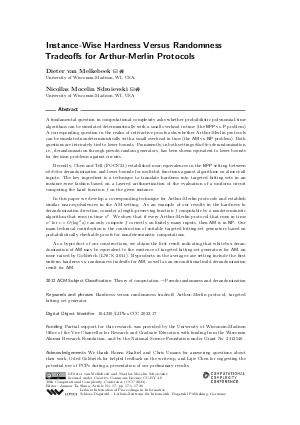@InProceedings{vanmelkebeek_et_al:LIPIcs.CCC.2023.17,
author = {van Melkebeek, Dieter and Mocelin Sdroievski, Nicollas},
title = {{Instance-Wise Hardness Versus Randomness Tradeoffs for Arthur-Merlin Protocols}},
booktitle = {38th Computational Complexity Conference (CCC 2023)},
pages = {17:1--17:36},
series = {Leibniz International Proceedings in Informatics (LIPIcs)},
ISBN = {978-3-95977-282-2},
ISSN = {1868-8969},
year = {2023},
volume = {264},
editor = {Ta-Shma, Amnon},
publisher = {Schloss Dagstuhl -- Leibniz-Zentrum f{\"u}r Informatik},
address = {Dagstuhl, Germany},
URL = {https://drops.dagstuhl.de/entities/document/10.4230/LIPIcs.CCC.2023.17},
URN = {urn:nbn:de:0030-drops-182870},
doi = {10.4230/LIPIcs.CCC.2023.17},
annote = {Keywords: Hardness versus randomness tradeoff, Arthur-Merlin protocol, targeted hitting set generator}
}

 Creative Commons Attribution 4.0 International license
Creative Commons Attribution 4.0 International license

